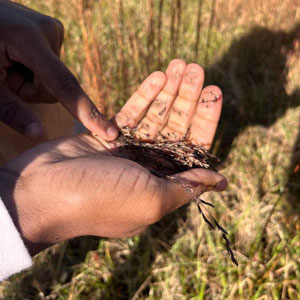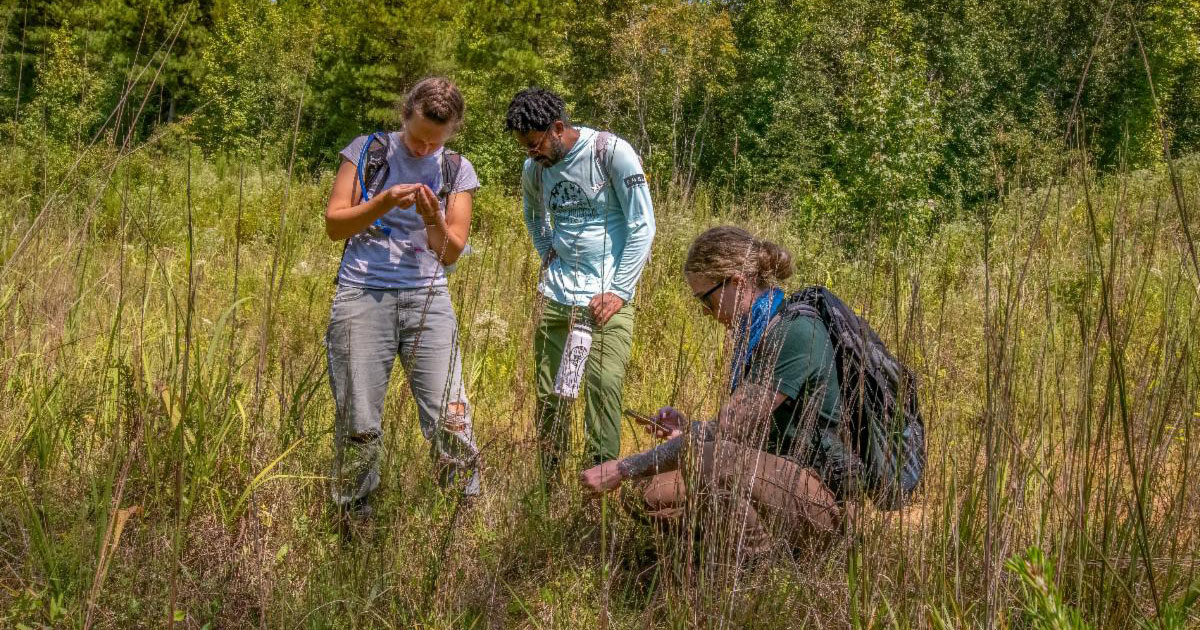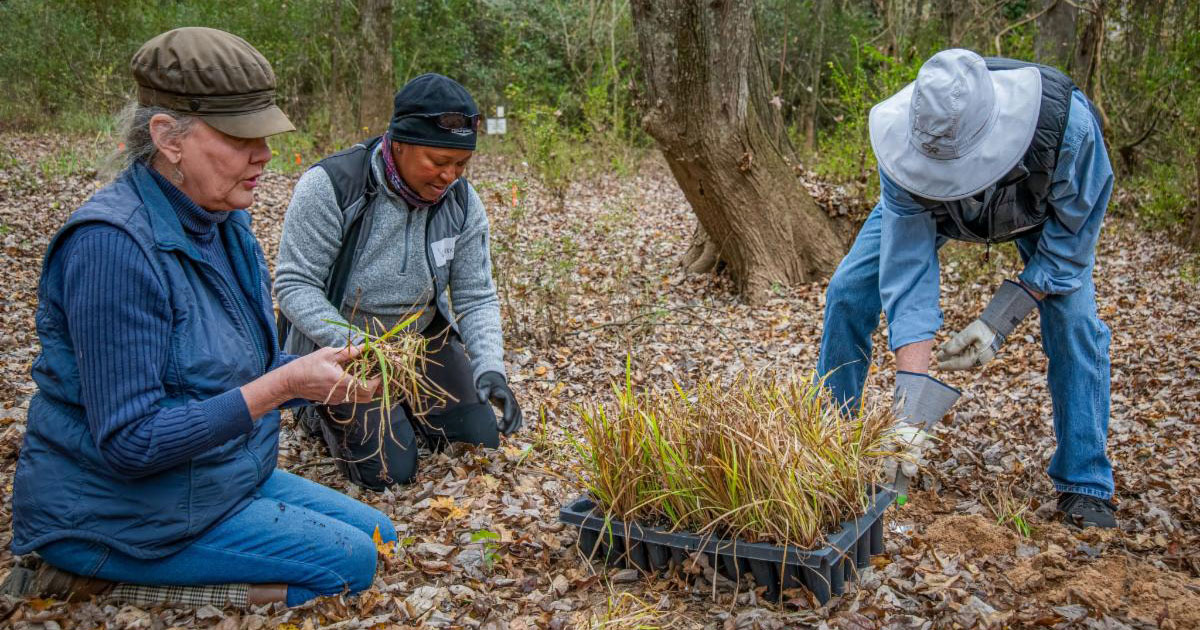The Steward: Restoration Recap
December 4th, 2023
By Lauren Ulich
Happy holidays from Upstate Forever's Stewardship team!
This has been an exciting year for stewardship as we welcomed Land Stewardship Coordinator Ericka Berg, launched our new Land Management Program, and transitioned The Steward newsletter to a digital format. We are grateful to you — our fantastic network of landowners — and look forward to what 2024 has in store!
Read on to learn about native grass seed collecting, an update from our restoration projects at Rocky River Nature Park in Anderson County, our new feature Easements with Ericka, and to see some photos from our visits in the field.
Sincerely,

Lauren Ulich
Stewardship & Land Restoration Manager

Ericka L. Berg
Land Stewardship Coordinator
Seeds of Success
The day could be described as nothing short of jubilant; the surrounding trees cloaked in full fall color, a bluebird sky, and the warmth of the sun on our face. We met early that day for one specific purpose, to collect seeds of native grasses for seed banking. Partners from the University of Georgia and the Southeastern Grassland Institute came prepared with a stockpile of paper bags, plant presses and data collection sheets — all simple but necessary items needed for our Seeds of Success collections.
An initiative of the Bureau of Land Management, the mission of the Seeds of Success program is to collect wildland native seed for research, development, germplasm conservation and ultimately, ecosystem restoration. For the uninitiated, seed banks are secure and climate-controlled facilities where seeds are curated and stored to protect the critically important genetic material held within each tiny seed. The thought of vaults, jam-packed with thousands of jars filled with seeds of all sizes, colors, and shapes might sound apocalyptic, but these facilities are useful tools for conservation in the face of plant diversity decline.
While the loss of plant diversity is a widespread concern, southeastern grasslands and the species they support are sadly disappearing at an unimaginable rate — a documented decline of at least 90%. The unique whistle of the charismatic and once prominent species bobwhite quail, a species entirely reliant on grasslands, is heard less frequently across the Upstate. This sentiment has been shared with me by countless landowners who reminisce on “the old days,” when their properties supported many coveys that filled the air with their songs each morning. These first seed collections in South Carolina will play a crucial role in the conservation of this imperiled ecosystem, the species they support, and the unique character of the Upstate.
 Throughout the day, we traversed expansive pastures, sunbaked powerline right of ways, and open woodlands seeking common but important species such as purpletop, beaked panicgrass, longleaf wood oats, little bluestem and river oats. We carefully counted numbers of plants in each population and estimated the numbers of seeds in each collection, making sure to capture adequate genetic diversity and at the same time, taking care not to over collect from these wild populations. At the end of the day, with collection bags labelled and full of seeds, our first year of collections was complete. Once cleaned, the seeds are destined for a seed banking facility for long-term storage for future restoration work and research.
Throughout the day, we traversed expansive pastures, sunbaked powerline right of ways, and open woodlands seeking common but important species such as purpletop, beaked panicgrass, longleaf wood oats, little bluestem and river oats. We carefully counted numbers of plants in each population and estimated the numbers of seeds in each collection, making sure to capture adequate genetic diversity and at the same time, taking care not to over collect from these wild populations. At the end of the day, with collection bags labelled and full of seeds, our first year of collections was complete. Once cleaned, the seeds are destined for a seed banking facility for long-term storage for future restoration work and research.
This collaborative partnership is aligned with the restoration goals of Upstate Forever's Land Management Program. Further, this effort is a case study in how conserved lands can support habitat restoration effort with benefits expanding beyond a property’s boundaries. As we aim to improve management and enhance grassland habitat throughout our network of conserved properties in the Upstate, we must also support native plant materials research to ensure availability of regionally appropriate restoration material for future projects.
As autumn quickly fades to winter, we encourage you to appreciate the undeniable beauty of native grasses in full glorious bloom on roadsides, pastures and forest edges, and remember, even the tiniest of seeds holds hope for the preservation of this precious Upstate ecosystem.
We would love to hear from our landowners! Are you interested in learning more about native grasses or are you interested in improving grassland habitat on your property? Reach out to Lauren Ulich at lulich@upstateforever.org to learn more.
Restoration Recap: Rocky River Nature Park
As reported in the previous Steward digital newsletter, we have initiated a riparian buffer enhancement project at the Rocky River Nature Park in Anderson. This project, funded by the Anderson County Watershed Protection Council, includes buffer habitat improvement and community outreach.
On a cool November day, more than 30 volunteers helped plant over 400 native wildflowers, sedges and grasses to enhance the buffer habitat for the rare swamp rabbit, passerine birds, and other wildlife. Click here to view more photos on Facebook
Moving forward, Anderson University students will assist in monitoring the long-term success of the planting.
We look forward to the upcoming tree planting facilitated by Trees Upstate on January 27 at 9 am. Register here
 Let’s talk about ownership
Let’s talk about ownership
Legal ownership is an important factor of a conservation easement. If you plan to sell or transfer your property or a legal parcel of your property, let us know beforehand.
This includes transfers to an LLC, even if you own it. If your easement language requires sole ownership of parcels, a transfer of one parcel to an LLC could be considered a violation, and we can help walk you through potential solutions before it happens.
Every easement is unique. For more information on ownership restrictions for your easement, refer to the Subdividing and Ownership of Parcels section of your conservation agreement. Any transfer needs to be communicated so that we can keep our records up to date and continue helping you protect your beloved property.
Questions? Please reach out to Ericka at eberg@upstateforever.org.
Thank you for reading this digital edition of The Steward Landowner Newsletter! To receive this and other exclusive content for conservation easement landowners directly in your inbox, please visit upstateforever.org/email.
Header photo of Jocassee Gorges by Doug Young



